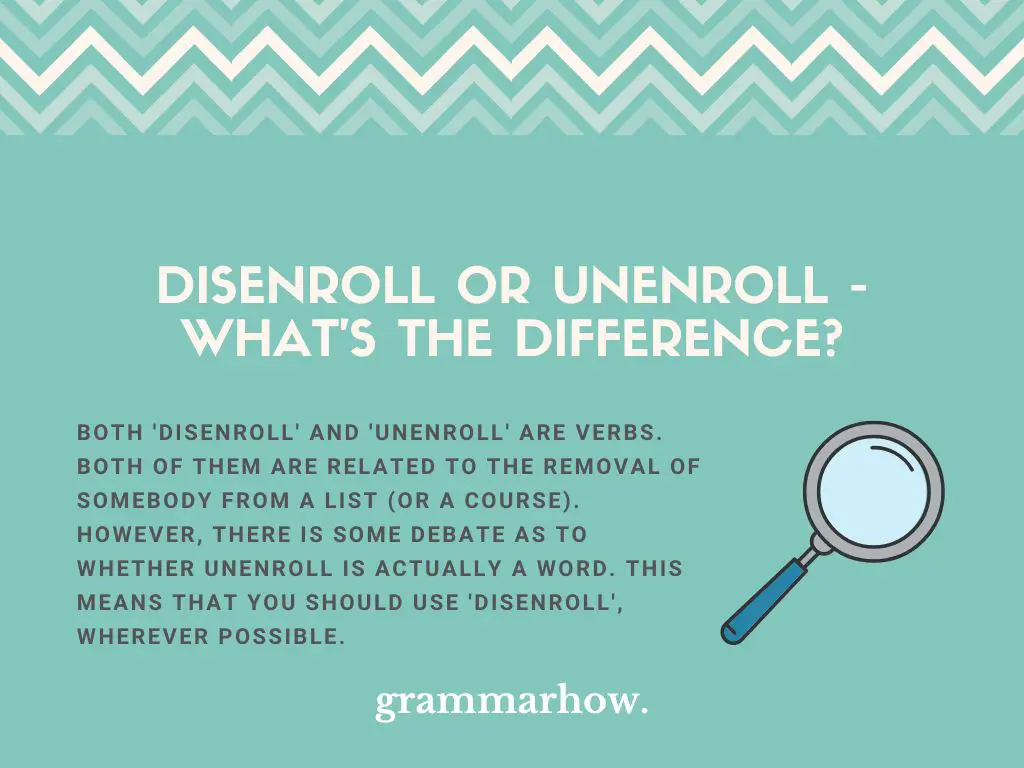The verbs disenroll and unenroll can be somewhat confusing. For starters, there is some debate as to whether one of them is an actual word. On this page, we want to tell you everything that you really need to know about how disenroll and unenroll work.
Disenroll or Unenroll – What’s the Difference?
Both ‘disenroll’ and ‘unenroll’ are verbs. Both of them are related to the removal of somebody from a list (or a course). However, there is some debate as to whether unenroll is actually a word. This means that you should use ‘disenroll’, wherever possible.

Both disenroll and unenroll mean the same thing. This means that they both involve the removal of somebody from a list, or perhaps a course. As we mentioned, there is some debate as to whether unenroll is a word, and you will find it listed in very few dictionaries.
There is some debate as to whether they even mean the same thing. For example, some would argue that disenroll is purely when you are removing yourself from a list, while unenroll can work in all situations. However, this is something that you can safely ignore. Both of these phrases are fully interchangeable.
Disenroll
Disenroll is a verb. When you say somebody will disenroll, it means that the person is removing their name from a list. This list could be anything. It could be a course. It could be medical insurance. If somebody removes you from a list, they are also said to ‘disenroll’.
So, is disenroll a word? Yes. Disenroll is a word. It is the opposite of ‘enroll’. Here is the definition of disenroll from the Cambridge Dictionary:
to remove someone’s name or your own name from a list.
Disenroll should always be used instead of unenroll. This is because some people (including many major dictionaries) will argue that unenroll simply cannot be used in this context.
Here is how to use disenroll in a sentence:
- He was struggling with the course, so he decided to disenroll.
- The teacher had to disenroll the student who was struggling with the course.
- She was struggling with her finances, so had to disenroll from her health insurance plan.
- They had to disenroll from the website.
- It is not uncommon for students to have to disenroll from university due to financial issues.
Unenroll
Unenroll is a verb. It is not best practice to use unenroll, though. This is because it isn’t commonly agreed to be a word. When you do see it used, it means to remove yourself or somebody else from a list e.g. you would disenroll from a course.
So, is unenroll a word? This is where there is a little bit of confusion. Some people believe it to be a word, while others don’t see it as such. For example, you won’t be able to find unenroll in the Cambridge Dictionary. You will be able to find it in the Macmillan Dictionary, but even that definition is not official.
That being said, you may still find it being used in everyday speech, although nowhere near as much as the counterpart ‘disenroll’. This is, mostly, because the antonym is enroll, and thus must people just automatically assume that unenroll is the correct word.
It is worth noting that ‘unenrolled’ is a word. It is not a verb. It is an adjective, and it means that somebody is not registered somewhere. We won’t go into depth on that here, because we purely want to discuss the words as verbs.
Here is how you can use unenroll in a sentence:
- The teacher had to unenroll the sick student from the class.
- The newsletter subscriber wanted to unenroll from the business newsletter.
- I had to unenroll from the course. It was just too difficult.
- If you fail to attend college, you may risk the teacher attempting to unenroll you from the course.
- It is not uncommon for people to be double-booked for classes. If that happens, they must unenroll from one.
What Is Used The Most?
According to Google Ngram Viewer, disenroll is used a lot more often than unenroll is. However, we suppose that this is something that does make sense. After all, most people do not seem to see unenroll as a word.

Final Thoughts
Both disenroll and unenroll mean the same thing. This is to remove yourself, or somebody else, from a list. It doesn’t matter what the list is. However, you should note that unenroll isn’t technically a word, so try to avoid using it wherever possible.

Martin holds a Master’s degree in Finance and International Business. He has six years of experience in professional communication with clients, executives, and colleagues. Furthermore, he has teaching experience from Aarhus University. Martin has been featured as an expert in communication and teaching on Forbes and Shopify. Read more about Martin here.

